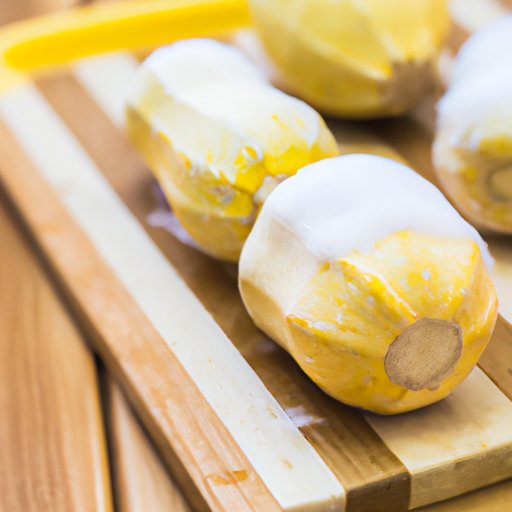
I. Introduction
Have you ever found yourself with an abundance of squash in your garden or from the store and unsure of what to do with it all? One simple solution is to freeze it for later use. Freezing squash is a great way to reduce waste and have a readily available ingredient for your favorite recipes. In this article, we’ll present a step-by-step guide to freezing squash, creative recipes for using frozen squash, tips for selecting the best squash for freezing, and a beginner’s guide to getting started. Additionally, we’ll discuss the benefits of freezing squash and address some frequently asked questions related to the process.
II. Step-by-step guide to freezing squash
The process of freezing squash begins with proper preparation. Before freezing, wash and dry your squash and cut off any stems or spots. Then, peel and remove the seeds or stringy pulp inside the squash. Cut it into cubes or in a size that best fits your recipe or storage container.
You may also choose to blanch the squash before freezing. Blanching involves boiling the squash for a brief period and then transferring it to an ice bath to halt the cooking and preserve its texture. Blanching is recommended for most types of squash, especially winter squash, as it helps them to last longer in the freezer without losing quality.
For the tools required to freeze squash, you’ll need a sharp knife, a cutting board, a large pot, a colander, a baking sheet, a freezer-safe bag or container, and a label or marker to identify the squash’s contents and date of storage.
When storing the frozen squash, be sure to remove as much air as possible to prevent freezer burn. You may choose to freeze the squash in portions suitable for individual recipes or as one large batch. To prevent the squash from becoming mushy when defrosted, we recommend using it within eight months.
III. Creative recipes for frozen squash
Freezing squash expands the possibilities of using this versatile vegetable in your cooking. Here are some of our favorites:
- Squash soup: A pureed squash soup is the perfect comfort food on a cold day. Add some heavy cream and a pinch of nutmeg for extra richness.
- Squash stew: Combine your frozen squash with legumes, meat or fish, and a variety of other vegetables for a hearty and nutritious stew.
- Squash casserole: Mix your squash with cheese, breadcrumbs, and spices for an easy and delicious side dish.
When it comes to pairing herbs and spices with your frozen squash, consider options like cinnamon, ginger, cumin, thyme, and rosemary. These seasonings complement the sweet and earthy flavors of the squash.
IV. Tips for selecting the best squash for freezing
Some types of squash freeze better than others. Summer squash, such as zucchini or yellow squash, can become too watery when frozen, making them less desirable. Winter squash, such as butternut or acorn squash, have a firmer texture and hold up well in the freezer.
Choose squash that is ripe and in good condition. Avoid squash that is soft or has visible blemishes as these may indicate spoilage.
V. A beginner’s guide to freezing squash
If you’re new to freezing squash, there’s no need to worry. Start by washing and drying the squash, followed by peeling and cubing it. Blanch if desired, then store in freezer-safe bags or containers. Label each with the contents and date for reference, and store in the freezer at zero degrees Fahrenheit.
VI. How to store frozen squash for the long term
To store the squash for the longest possible time, keep it in a freezer set at or below zero degrees Fahrenheit. When possible, use airtight freezer-safe containers or bags. This helps keep the squash free of freezer burn and prevents moisture loss. Squash stored in airtight containers or bags should remain fresh for up to 8 months.
VII. The benefits of freezing squash
Freezing your extra squash offers several benefits. For one, it can save time when preparing meals as the squash is already cut and ready to use. It also reduces food waste as you can preserve the squash before it spoils. This can be especially beneficial if you grow your own squash and have an oversized harvest. Additionally, having frozen squash on hand can reduce trips to the grocery store and save money on fresh produce purchases.
VIII. Frequently asked questions about freezing squash
Here are some of the most frequently asked questions about freezing squash:
- Does freezing squash affect its nutritional value? When squash is frozen, it may lose some nutritional value, particularly in terms of texture. However, its vitamin and mineral content remains largely intact.
- How long can I freeze squash? Frozen squash can last for up to eight months.
- Can I freeze cooked squash? Yes, you can freeze cooked squash, but it may have a softer texture after defrosting.
IX. Conclusion
Freezing squash is a simple and effective way to preserve this vegetable and reduce food waste. Starting with proper preparation, investing in the right tools and containers, and choosing the best squash for freezing will ensure the best results. Experiment with different recipes and pairings to discover new and exciting ways to enjoy your frozen squash.





